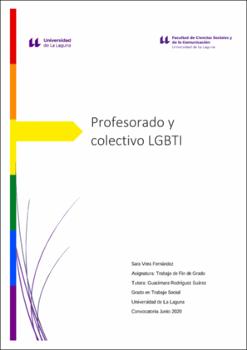Profesorado y colectivo LGBTI.
Autor
Vera Fernández, SaraFecha
2020Resumen
Este trabajo es un estudio sobre los conocimientos en materia LGBTI que tiene el
profesorado y por consiguiente cómo identifican un caso de LGBTIfobia escolar. Además
de conocer la percepción del profesorado respecto a las charlas de diversidad afectivosexual que tienen lugar en las aulas. Para ello se ha realizado una investigación en la que
han participado 36 profesores/as que imparten clase a secundaria y bachiller en diferentes
centros educativos. La información se ha recogido a través de un cuestionario
autoadministrado de elaboración propia. Las principales conclusiones fueron que cuanta
mayor formación tiene el profesorado en temática LGBTI, más aplica esta perspectiva en
clase. Pero, aunque casi toda totalidad de la muestra estaba a favor de las charlas de
diversidad afectivo-sexual en las aulas, posteriormente, había un porcentaje que no
aplicaba la perspectiva LGBTI al impartir las clases. Respecto a los casos LGBTIfobia se
puede decir que el profesorado sabe identificarlo en cuanto a su teoría se refiere, pero
posteriormente, en la práctica, no conoce bien si han tenido casos de LGBTIfobia en su
centro escolar. Por último, se recalca la importancia de usar referentes LGBTI y ejemplos
no heteronormativos en las aulas ya que esto hace que se normalicen las realidades
existentes. This work is a study on the knowledge on LGBTI that teachers have and therefore
how they identify a case of LGBTIphobia at school. In addition to knowing the teachers'
perception regarding the talks on affective-sexual diversity that take place in classrooms.
For this, an investigation has been carried out to 36 teachers who teach secondary school
and high school in different educational centers. The information has been collected
through a self-administered self-prepared questionnaire. The main conclusions were that
the more training teachers have on LGBTI issues, the more this perspective is applied in
class. But, although almost all of the teachers were in favor of talks on affective-sexual
diversity in classrooms, later, there was a percentage that did not apply the LGBTI
perspective when they are teaching. Regarding LGBTIphobia cases, teachers know how
to identify it theoretically,, but later, in practice, they do not know well whether
LGBTIphobia cases have taken place in their school. Finally, the importance of using
LGBTI references and non-heteronormative examples in the classrooms is emphasized,
because this makes that existing realities be normalized





